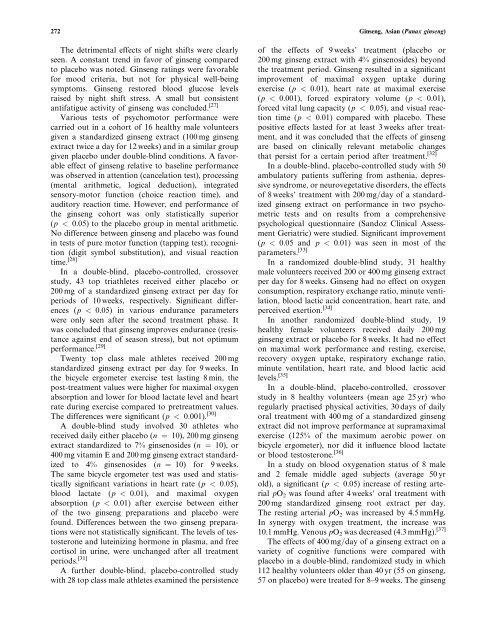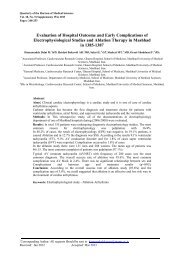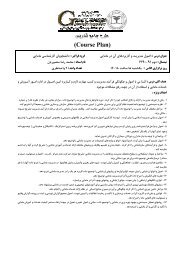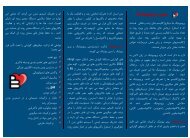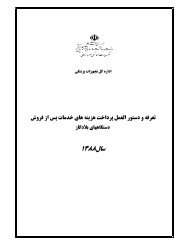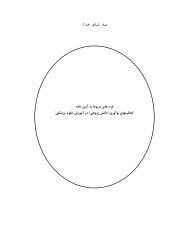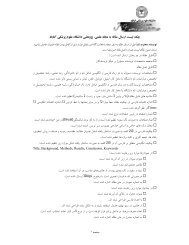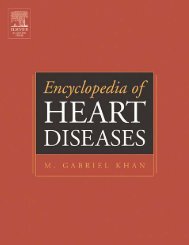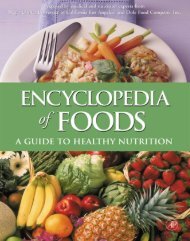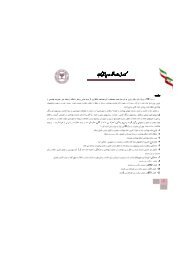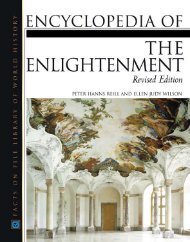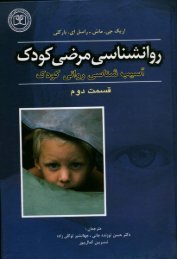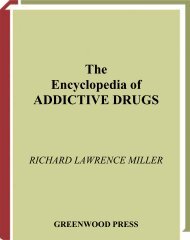- Page 2:
Encyclopedia of Dietary Supplements
- Page 5 and 6:
This is intended as a reference wor
- Page 8 and 9:
Reviewers The Editors wish to thank
- Page 10 and 11:
Contributors Steve F. Abcouwer = Un
- Page 12 and 13:
xi Leslie M. Klevay = Grand Forks H
- Page 14:
xiii Kristian Strømgaard = The Dan
- Page 17 and 18:
xvi Green Tea Polyphenols = Shengmi
- Page 19:
xviii that, after this first editio
- Page 23 and 24:
2 S-Adenosylmethionine that methion
- Page 25 and 26:
4 S-Adenosylmethionine Treatment of
- Page 27 and 28:
6 S-Adenosylmethionine 10. Avila, M
- Page 29 and 30:
8 Androstenedione involved in the c
- Page 31 and 32:
10 Androstenedione increases in ser
- Page 33 and 34:
12 Androstenedione Catlin and colle
- Page 36 and 37:
L-Arginine Mauro Maccario Emanuela
- Page 38 and 39:
L-Arginine 17 L-Arginine, its precu
- Page 40 and 41:
L-Arginine 19 Reduced NO production
- Page 42 and 43:
L-Arginine 21 7. and the Pituitary;
- Page 44 and 45:
L-Arginine 23 52. with IDDM and NID
- Page 46 and 47:
Astragalus Roy Upton American Herba
- Page 48 and 49:
Astragalus 27 The ability of an ast
- Page 50 and 51:
Astragalus 29 medicine suggests tha
- Page 52 and 53:
Biotin Donald M. Mock University of
- Page 54 and 55:
Biotin 33 of 3-hydroxypropionic aci
- Page 56 and 57:
Biotin 35 on Na þ . Biocytin does
- Page 58 and 59:
Biotin 37 disturbances in brain fat
- Page 60 and 61:
Biotin 39 28. Spector, R.; Mock, D.
- Page 62 and 63:
Black Cohosh (Cimicifuga racemosa)
- Page 64 and 65:
Black Cohosh (Cimicifuga racemosa)
- Page 66 and 67:
Black Cohosh (Cimicifuga racemosa)
- Page 68 and 69:
Black Cohosh (Cimicifuga racemosa)
- Page 70 and 71:
Black Cohosh (Cimicifuga racemosa)
- Page 72 and 73:
Black Cohosh (Cimicifuga racemosa)
- Page 74 and 75:
Black Cohosh (Cimicifuga racemosa)
- Page 76 and 77:
Boron Curtiss D. Hunt United States
- Page 78 and 79:
Boron 57 Fig. 5 Boron reversibly in
- Page 80 and 81:
Boron 59 Fig. 9 Schematic represent
- Page 82 and 83:
Boron 61 boron nutriture. Findings
- Page 84:
Boron 63 33. Meacham, S.L.; Taper,
- Page 87 and 88:
66 Calcium bony structural weakness
- Page 89 and 90:
68 Calcium ∆ TOTAL SERUM CALCIUM
- Page 91 and 92:
70 Calcium Ancillary Therapy for Pr
- Page 94 and 95:
L-Carnitine and Acetyl-L-Carnitine
- Page 96 and 97:
L-Carnitine and Acetyl-L-Carnitine
- Page 98 and 99:
L-Carnitine and Acetyl-L-Carnitine
- Page 100 and 101:
L-Carnitine and Acetyl-L-Carnitine
- Page 102 and 103:
-Carotene Elizabeth J. Johnson Robe
- Page 104 and 105:
-Carotene 83 efficiency of absorpti
- Page 106 and 107:
-Carotene 85 Table 3 b-Carotene sup
- Page 108:
-Carotene 87 32. The Alpha-Tocopher
- Page 111 and 112:
90 Cascara Sagrada (Rhamnus purshia
- Page 113 and 114:
92 Cascara Sagrada (Rhamnus purshia
- Page 116 and 117:
Chasteberry (Vitex agnus castus) Ga
- Page 118 and 119:
Chasteberry (Vitex agnus castus) 97
- Page 120 and 121:
Chasteberry (Vitex agnus castus) 99
- Page 122 and 123:
Chasteberry (Vitex agnus castus) 10
- Page 124:
Chasteberry (Vitex agnus castus) 10
- Page 127 and 128:
106 Choline HO As discussed earlier
- Page 129 and 130:
108 Choline memory impairment which
- Page 131 and 132:
110 Choline and homocysteine nutrit
- Page 134 and 135:
Chondroitin Christopher G. Jackson
- Page 136 and 137:
Chondroitin 115 chromatography (HPL
- Page 138 and 139:
Chondroitin 117 joint pain only for
- Page 140:
Chondroitin 119 elders in the Frami
- Page 143 and 144:
122 Coenzyme Q10 hypercholesterolem
- Page 145 and 146:
124 Coenzyme Q10 elimination of the
- Page 147 and 148:
126 Coenzyme Q10 fatty acids on one
- Page 149 and 150:
128 Coenzyme Q10 acetylsalicylic ac
- Page 151 and 152:
130 Coenzyme Q10 Dosage So far, no
- Page 154 and 155:
Copper Leslie M. Klevay Grand Forks
- Page 156 and 157:
Copper 135 adults, and low rates of
- Page 158 and 159:
Copper 137 recently minted pennies
- Page 160 and 161:
Copper 139 during experimental copp
- Page 162:
Copper 141 beats, and sudden corona
- Page 165 and 166:
144 Cranberry (Vaccinium macrocarpo
- Page 167 and 168:
146 Cranberry (Vaccinium macrocarpo
- Page 169 and 170:
148 Cranberry (Vaccinium macrocarpo
- Page 172 and 173:
Creatine G.S. Salomons VU Universit
- Page 174 and 175:
Creatine 153 cytosol to the sites o
- Page 176 and 177:
Creatine 155 degrees, expressive sp
- Page 178 and 179:
Creatine 157 Cr supplementation in
- Page 180 and 181:
Dang Gui (Angelica sinensis) Roy Up
- Page 182 and 183:
Dang Gui (Angelica sinensis) 161 Gy
- Page 184 and 185:
Dang Gui (Angelica sinensis) 163 wi
- Page 186 and 187:
Dang Gui (Angelica sinensis) 165 sy
- Page 188 and 189:
Dehydroepiandrosterone (DHEA) Salva
- Page 190 and 191:
Dehydroepiandrosterone (DHEA) 169 A
- Page 192 and 193:
Dehydroepiandrosterone (DHEA) 171 l
- Page 194 and 195:
Dehydroepiandrosterone (DHEA) 173 D
- Page 196 and 197:
Dehydroepiandrosterone (DHEA) 175 f
- Page 198 and 199:
Echinacea Rudolf Bauer Karin Woelka
- Page 200 and 201:
Echinacea 179 to study separately t
- Page 202 and 203:
Echinacea 181 Fig. 6 Tartaric acid
- Page 204 and 205:
Echinacea 183 (microsomes from ram
- Page 206 and 207:
Echinacea 185 The Commission E warn
- Page 208:
Echinacea 187 Echinacea plant (Echi
- Page 211 and 212:
190 Ephedra (Ma Huang) Early studie
- Page 213 and 214:
192 Ephedra (Ma Huang) assessed. Th
- Page 215 and 216:
194 Ephedra (Ma Huang) FUTURE RESEA
- Page 218 and 219:
Evening Primrose (Oenothera biennis
- Page 220 and 221:
Evening Primrose (Oenothera biennis
- Page 222 and 223:
Evening Primrose (Oenothera biennis
- Page 224 and 225:
Evening Primrose (Oenothera biennis
- Page 226 and 227:
Evening Primrose (Oenothera biennis
- Page 228 and 229:
Evening Primrose (Oenothera biennis
- Page 230 and 231:
Evening Primrose (Oenothera biennis
- Page 232 and 233:
Feverfew (Tanacetum parthenium) Den
- Page 234 and 235:
Feverfew (Tanacetum parthenium) 213
- Page 236 and 237:
Feverfew (Tanacetum parthenium) 215
- Page 238:
Feverfew (Tanacetum parthenium) 217
- Page 241 and 242: 220 Folate Table 1 Metabolically ac
- Page 243 and 244: 222 Folate is excreted within 24 hr
- Page 245 and 246: 224 Folate one-carbon flux into thy
- Page 247 and 248: 226 Folate The appropriate setting
- Page 249 and 250: 228 Folate Shields, D.C.; Scott, J.
- Page 251 and 252: 230 Garlic (Allium sativum) Fig. 1
- Page 253 and 254: 232 Garlic (Allium sativum) be most
- Page 255 and 256: 234 Garlic (Allium sativum) The ant
- Page 257 and 258: 236 Garlic (Allium sativum) Dietary
- Page 259 and 260: 238 Garlic (Allium sativum) hyperch
- Page 261 and 262: 240 Garlic (Allium sativum) 92. Kwo
- Page 263 and 264: 242 Ginger (Zingiber officinale) Mo
- Page 265 and 266: 244 Ginger (Zingiber officinale) pe
- Page 267 and 268: 246 Ginger (Zingiber officinale) AD
- Page 269 and 270: 248 Ginger (Zingiber officinale) fe
- Page 271 and 272: 250 Ginkgo biloba Fig. 1 A Ginkgo b
- Page 273 and 274: 252 Ginkgo biloba O O Me R 3 3 R1 H
- Page 275 and 276: 254 Ginkgo biloba Several studies h
- Page 277 and 278: 256 Ginkgo biloba REGULATORY STATUS
- Page 280 and 281: Ginseng, American (Panax quinquefol
- Page 282 and 283: Ginseng, American (Panax quinquefol
- Page 284 and 285: Ginseng, American (Panax quinquefol
- Page 286 and 287: Ginseng, Asian (Panax ginseng) Fabi
- Page 288 and 289: Ginseng, Asian (Panax ginseng) 267
- Page 290 and 291: Ginseng, Asian (Panax ginseng) 269
- Page 294 and 295: Ginseng, Asian (Panax ginseng) 273
- Page 296 and 297: Ginseng, Asian (Panax ginseng) 275
- Page 298: Ginseng, Asian (Panax ginseng) 277
- Page 301 and 302: 280 Glucosamine lubricin on its sur
- Page 303 and 304: 282 Glucosamine HOCH2 CH2OH HO O OH
- Page 305 and 306: 284 Glucosamine size was deemed to
- Page 307 and 308: 286 Glucosamine 21. Hochberg, M.C.;
- Page 309 and 310: 288 Glutamine be formed because it
- Page 311 and 312: 290 Glutamine In the perivenous sec
- Page 313 and 314: 292 Glutamine Including glutamine-c
- Page 315 and 316: 294 Glutamine 7. Collins, C.L.; Was
- Page 317 and 318: 296 Glutamine 60. Kozelsky, T.F.; M
- Page 319 and 320: 298 Goldenseal (Hydrastis canadensi
- Page 321 and 322: 300 Goldenseal (Hydrastis canadensi
- Page 323 and 324: 302 Goldenseal (Hydrastis canadensi
- Page 325 and 326: 304 Goldenseal (Hydrastis canadensi
- Page 327 and 328: 306 Goldenseal (Hydrastis canadensi
- Page 329 and 330: 308 Goldenseal (Hydrastis canadensi
- Page 331 and 332: 310 Grape Seed Extract 4.0% of the
- Page 333 and 334: 312 Grape Seed Extract Numerous stu
- Page 335 and 336: 314 Grape Seed Extract PHARMACOKINE
- Page 337 and 338: 316 Grape Seed Extract as yet the r
- Page 339 and 340: 318 Grape Seed Extract of larger mo
- Page 341 and 342: 320 Grape Seed Extract 8. Krueger,
- Page 343 and 344:
322 Grape Seed Extract 46. Sen, C.K
- Page 345 and 346:
324 Grape Seed Extract inhibitory r
- Page 348 and 349:
Green Tea Polyphenols Shengmin Sang
- Page 350 and 351:
Green Tea Polyphenols 329 1-methyl-
- Page 352 and 353:
Green Tea Polyphenols 331 the activ
- Page 354 and 355:
Green Tea Polyphenols 333 volunteer
- Page 356 and 357:
Green Tea Polyphenols 335 by green
- Page 358 and 359:
Hawthorn (Crataegus) Werner R. Buss
- Page 360 and 361:
Hawthorn (Crataegus) 339 extracts:
- Page 362 and 363:
Hawthorn (Crataegus) 341 of atheros
- Page 364 and 365:
Table 1 Clinical studies with hawth
- Page 366 and 367:
Hawthorn (Crataegus) 345 In a place
- Page 368:
Hawthorn (Crataegus) 347 30. Dai, Y
- Page 371 and 372:
350 5-Hydroxytryptophan HO after ad
- Page 373 and 374:
352 5-Hydroxytryptophan and would s
- Page 375 and 376:
354 5-Hydroxytryptophan 5-HTP be al
- Page 378 and 379:
Iron John Beard The Pennsylvania St
- Page 380 and 381:
Iron 359 Fe 2+ Fe 3+ ? ? DMT1 DcytB
- Page 382 and 383:
Iron 361 of inflammation must be co
- Page 384 and 385:
Isoflavones Mark Messina School of
- Page 386 and 387:
Isoflavones 365 20% of the stated a
- Page 388 and 389:
Isoflavones 367 rodent mammary glan
- Page 390 and 391:
Isoflavones 369 humans. [81] Thus,
- Page 392 and 393:
Isoflavones 371 men of Japanese anc
- Page 394 and 395:
Kava (Piper methysticum) Steven M.
- Page 396 and 397:
Kava (Piper methysticum) 375 O O O
- Page 398 and 399:
Kava (Piper methysticum) 377 are re
- Page 400 and 401:
Kava (Piper methysticum) 379 does c
- Page 402 and 403:
Lactobacilli and Bifidobacteria Lin
- Page 404 and 405:
Lactobacilli and Bifidobacteria 383
- Page 406 and 407:
Lactobacilli and Bifidobacteria 385
- Page 408 and 409:
Lactobacilli and Bifidobacteria 387
- Page 410:
Lactobacilli and Bifidobacteria 389
- Page 413 and 414:
392 Licorice (Glycyrrhiza glabra) F
- Page 415 and 416:
394 Licorice (Glycyrrhiza glabra) D
- Page 417 and 418:
396 Licorice (Glycyrrhiza glabra) B
- Page 419 and 420:
398 Licorice (Glycyrrhiza glabra) m
- Page 422 and 423:
a-Lipoic Acid/Thioctic Acid Donald
- Page 424 and 425:
a-Lipoic Acid/Thioctic Acid 403 Fig
- Page 426 and 427:
a-Lipoic Acid/Thioctic Acid 405 mam
- Page 428:
a-Lipoic Acid/Thioctic Acid 407 47.
- Page 431 and 432:
410 Lutein a reasonable basis for s
- Page 433 and 434:
412 Lutein interaction with both wa
- Page 435 and 436:
414 Lutein under fasting conditions
- Page 437 and 438:
416 Lutein factors influencing inta
- Page 439 and 440:
418 Lutein capable of stimulating a
- Page 441 and 442:
420 Lutein 28. Snodderly, D.M.; Aur
- Page 443 and 444:
422 Lycopene Table 1 Common food so
- Page 445 and 446:
424 Lycopene Our ability to detect
- Page 447 and 448:
426 Lycopene mildly and severely ho
- Page 449 and 450:
428 Lycopene concept that lycopene-
- Page 451 and 452:
430 Lycopene WHOLE FOODS VS. SUPPLE
- Page 453 and 454:
432 Lycopene 46. Stahl, W.; Sies, H
- Page 455 and 456:
434 Lycopene 99. Gann, P.H.; Ma, J.
- Page 457 and 458:
436 Maca (Lepidium meyenii) specime
- Page 459 and 460:
438 Maca (Lepidium meyenii) Table 2
- Page 461 and 462:
440 Maca (Lepidium meyenii) on sexu
- Page 463 and 464:
442 Maca (Lepidium meyenii) the cul
- Page 466 and 467:
Magnesium Robert K. Rude University
- Page 468 and 469:
Magnesium 447 Mg intake, 30-40% is
- Page 470 and 471:
Magnesium 449 Table 2 Mg (mg) Recom
- Page 472 and 473:
Magnesium 451 11q23 and has been id
- Page 474 and 475:
Magnesium 453 Chronic Latent Defici
- Page 476:
Magnesium 455 Hoenderop, J.G.J. TRP
- Page 479 and 480:
458 Melatonin serotonin and melaton
- Page 481 and 482:
460 Melatonin chromatography-spectr
- Page 483 and 484:
462 Melatonin routes of administrat
- Page 485 and 486:
464 Melatonin against auto-oxidatio
- Page 487 and 488:
466 Melatonin 25. Waldhauser, F.; L
- Page 489 and 490:
468 Milk Thistle (Silybum marianum)
- Page 491 and 492:
470 Milk Thistle (Silybum marianum)
- Page 493 and 494:
472 Milk Thistle (Silybum marianum)
- Page 495 and 496:
474 Milk Thistle (Silybum marianum)
- Page 497 and 498:
476 Milk Thistle (Silybum marianum)
- Page 499 and 500:
478 Milk Thistle (Silybum marianum)
- Page 501 and 502:
480 Milk Thistle (Silybum marianum)
- Page 503 and 504:
482 Milk Thistle (Silybum marianum)
- Page 505 and 506:
484 Niacin Tryptophan N-formylkynur
- Page 507 and 508:
486 Niacin thereby affecting protei
- Page 509 and 510:
488 Niacin of tryptophan lead to in
- Page 511 and 512:
490 Niacin B., Eds.; Academic Press
- Page 514 and 515:
Omega-3 Fatty Acids William S. Harr
- Page 516 and 517:
Omega-3 Fatty Acids 495 limit brain
- Page 518 and 519:
Omega-3 Fatty Acids 497 consistent
- Page 520 and 521:
Omega-3 Fatty Acids 499 will be nee
- Page 522 and 523:
Omega-3 Fatty Acids 501 27. Marches
- Page 524 and 525:
Omega-3 Fatty Acids 503 and consump
- Page 526 and 527:
Omega-6 Fatty Acids William L. Smit
- Page 528 and 529:
Omega-6 Fatty Acids 507 contain rel
- Page 530 and 531:
Omega-6 Fatty Acids 509 acids, PUFA
- Page 532 and 533:
Omega-6 Fatty Acids 511 of esterifi
- Page 534 and 535:
Omega-6 Fatty Acids 513 has been ad
- Page 536:
Omega-6 Fatty Acids 515 37. Cao, Y.
- Page 539 and 540:
518 Pantothenic Acid O CO 2H α-ket
- Page 541 and 542:
520 Pantothenic Acid O CH2 H H O P
- Page 543 and 544:
522 Pantothenic Acid Coenzyme A in
- Page 545 and 546:
524 Pantothenic Acid claims include
- Page 548 and 549:
Pau d’Arco or Lapacho (Tabebuia)
- Page 550 and 551:
Pau d’Arco or Lapacho (Tabebuia)
- Page 552 and 553:
Pau d’Arco or Lapacho (Tabebuia)
- Page 554 and 555:
Pau d’Arco or Lapacho (Tabebuia)
- Page 556:
Pau d’Arco or Lapacho (Tabebuia)
- Page 559 and 560:
538 Phosphorus Table 1 Commonly use
- Page 561 and 562:
540 Phosphorus PHOSPHATE IN BONE MI
- Page 563 and 564:
542 Phosphorus Fig. 4 The postulate
- Page 566 and 567:
Pycnogenol Õ , French Maritime Pin
- Page 568 and 569:
Pycnogenol Õ , French Maritime Pin
- Page 570 and 571:
Pycnogenol Õ , French Maritime Pin
- Page 572 and 573:
Pycnogenol Õ , French Maritime Pin
- Page 574:
Pycnogenol Õ , French Maritime Pin
- Page 577 and 578:
556 Proanthocyanidins studies were
- Page 579 and 580:
558 Proanthocyanidins Mechanisms of
- Page 581 and 582:
560 Proanthocyanidins and significa
- Page 583 and 584:
562 Proanthocyanidins been traditio
- Page 585 and 586:
564 Proanthocyanidins dietary intak
- Page 587 and 588:
566 Proanthocyanidins 48. Murphy, K
- Page 589 and 590:
568 Proanthocyanidins America—NHA
- Page 591 and 592:
570 Pygeum africanum Extract infect
- Page 593 and 594:
572 Pygeum africanum Extract obstru
- Page 595 and 596:
574 Pygeum africanum Extract (50 co
- Page 598 and 599:
Quercetin Jae B. Park Phytonutrient
- Page 600 and 601:
Quercetin 579 after a single 4 g do
- Page 602 and 603:
Quercetin 581 cGMP-phosphodiesteras
- Page 604 and 605:
Quercetin 583 25. O’Leary, K.A.;
- Page 606:
Quercetin 585 Fisetin, a flavonol,
- Page 609 and 610:
588 Red Clover (Trifolium pratense)
- Page 611 and 612:
590 Red Clover (Trifolium pratense)
- Page 613 and 614:
592 Red Clover (Trifolium pratense)
- Page 615 and 616:
594 Red Clover (Trifolium pratense)
- Page 617 and 618:
596 Red Clover (Trifolium pratense)
- Page 619 and 620:
598 Red Clover (Trifolium pratense)
- Page 621 and 622:
600 Red Clover (Trifolium pratense)
- Page 623 and 624:
602 Red Clover (Trifolium pratense)
- Page 625 and 626:
604 Reishi or Ling Zhi (Ganoderma l
- Page 627 and 628:
606 Reishi or Ling Zhi (Ganoderma l
- Page 629 and 630:
608 Reishi or Ling Zhi (Ganoderma l
- Page 631 and 632:
610 Reishi or Ling Zhi (Ganoderma l
- Page 633 and 634:
612 Reishi or Ling Zhi (Ganoderma l
- Page 635 and 636:
614 Reishi or Ling Zhi (Ganoderma l
- Page 637 and 638:
616 Reishi or Ling Zhi (Ganoderma l
- Page 639 and 640:
618 Reishi or Ling Zhi (Ganoderma l
- Page 641 and 642:
620 Reishi or Ling Zhi (Ganoderma l
- Page 643 and 644:
622 Reishi or Ling Zhi (Ganoderma l
- Page 645 and 646:
624 Riboflavin relationships of the
- Page 647 and 648:
626 Riboflavin metabolism by interf
- Page 649 and 650:
628 Riboflavin mitochondrial disord
- Page 651 and 652:
630 Riboflavin that riboflavin supp
- Page 653 and 654:
632 Riboflavin riboflavin status on
- Page 656 and 657:
Saw Palmetto (Serenoa repens) Edwar
- Page 658 and 659:
Saw Palmetto (Serenoa repens) 637 r
- Page 660 and 661:
Saw Palmetto (Serenoa repens) 639 t
- Page 662 and 663:
Saw Palmetto (Serenoa repens) 641 B
- Page 664 and 665:
Saw Palmetto (Serenoa repens) 643
- Page 666 and 667:
Selenium Raymond F. Burk Brooke K.
- Page 668 and 669:
Selenium 647 Selenoproteins involve
- Page 670 and 671:
Selenium 649 origin are more reliab
- Page 672 and 673:
Selenium 651 2. Painter, E.P. The c
- Page 674 and 675:
Shiitake (Lentinus edodes) Solomon
- Page 676 and 677:
Shiitake (Lentinus edodes) 655 Tabl
- Page 678 and 679:
Shiitake (Lentinus edodes) 657 acti
- Page 680 and 681:
Shiitake (Lentinus edodes) 659 Fig.
- Page 682 and 683:
Shiitake (Lentinus edodes) 661 immu
- Page 684 and 685:
Shiitake (Lentinus edodes) 663 REFE
- Page 686 and 687:
St. John’s Wort (Hypericum perfor
- Page 688 and 689:
St. John’s Wort (Hypericum perfor
- Page 690 and 691:
St. John’s Wort (Hypericum perfor
- Page 692 and 693:
St. John’s Wort (Hypericum perfor
- Page 694 and 695:
St. John’s Wort (Hypericum perfor
- Page 696 and 697:
St. John’s Wort (Hypericum perfor
- Page 698 and 699:
Thiamin Gianguido Rindi Cesare Patr
- Page 700 and 701:
Thiamin 679 Table 1 Thiamin (T), th
- Page 702 and 703:
Thiamin 681 Table 2 Thiamin (T), th
- Page 704 and 705:
Thiamin 683 the depressed basal act
- Page 706 and 707:
Thiamin 685 0 0.1 0.2 0.3 0.4 0.5 0
- Page 708 and 709:
Valerian Dennis V.C. Awang MediPlan
- Page 710 and 711:
Valerian 689 taken at least 1 hr be
- Page 712 and 713:
Valerian 691 CH 3 R H OH CH CH2R 2R
- Page 714 and 715:
Valerian 693 An assessment of their
- Page 716 and 717:
Valerian 695 66 Feelings of rapid f
- Page 718 and 719:
Valerian 697 aqueous extract of val
- Page 720 and 721:
Valerian 699 29. Schulz, V.; Hänse
- Page 722 and 723:
Vitamin A A. Catharine Ross The Pen
- Page 724 and 725:
Vitamin A 703 facilitates the forma
- Page 726 and 727:
Vitamin A 705 retinol esterificatio
- Page 728 and 729:
Vitamin A 707 mobilized, and then r
- Page 730 and 731:
Vitamin A 709 Table 2 Units of vita
- Page 732 and 733:
Vitamin A 711 Table 5 Tolerable upp
- Page 734:
Vitamin A 713 33. Lin, Y.; Dueker,
- Page 737 and 738:
716 Vitamin B6 Table 1 Historical h
- Page 739 and 740:
718 Vitamin B6 Table 3 Methods for
- Page 741 and 742:
720 Vitamin B6 coenzyme for transam
- Page 743 and 744:
722 Vitamin B6 increased uptake of
- Page 745 and 746:
724 Vitamin B6 methionine intake. T
- Page 747 and 748:
726 Vitamin B6 Table 5 Toxicity sym
- Page 749 and 750:
728 Vitamin B6 34. Brophy, M.H.; Si
- Page 751 and 752:
730 Vitamin B6 and behavior. In Vit
- Page 753 and 754:
732 Vitamin B6 140. Hankes, L.V.; L
- Page 755 and 756:
734 Vitamin B6 carpal tunnel syndro
- Page 757 and 758:
736 Vitamin B12 Table 1 Cobalamins
- Page 759 and 760:
738 Vitamin B12 excess when vitamin
- Page 761 and 762:
740 Vitamin B12 There are many case
- Page 763 and 764:
742 Vitamin B12 can be injected int
- Page 765 and 766:
744 Vitamin B12 31. Allen, L.H. Imp
- Page 767 and 768:
746 Vitamin C unreactive and does n
- Page 769 and 770:
748 Vitamin C neutrophil and surrou
- Page 771 and 772:
750 Vitamin C Plasma Vitamin C (µM
- Page 773 and 774:
752 Vitamin C Possible Benefits of
- Page 775 and 776:
754 Vitamin C ADVERSE EFFECTS The t
- Page 778 and 779:
Vitamin E Maret G. Traber Linus Pau
- Page 780 and 781:
Vitamin E 759 Specifically, it modu
- Page 782 and 783:
Vitamin E 761 Dietary vitamin E for
- Page 784 and 785:
Vitamin E 763 recommended 1000 mg a
- Page 786 and 787:
Vitamin E 765 inhibition enhance pl
- Page 788 and 789:
Vitamin E 767 2,7,8-trimethyl-2-(be
- Page 790:
Vitamin E 769 110. Brown, B.G.; Zha
- Page 793 and 794:
772 Vitamin K Fig. 1 Structures of
- Page 795 and 796:
774 Vitamin K was the bone protein
- Page 797 and 798:
776 Vitamin K Fig. 4 Structure of d
- Page 799 and 800:
778 Vitamin K VITAMIN K AND SKELETA
- Page 801 and 802:
780 Vitamin K 28. Presnell, S.R.; S
- Page 803 and 804:
782 Vitamin K 78. Iwamoto, I.; Kosh
- Page 805 and 806:
784 Yohimbe (Pausinystalia johimbe)
- Page 807 and 808:
786 Yohimbe (Pausinystalia johimbe)
- Page 809 and 810:
788 Yohimbe (Pausinystalia johimbe)
- Page 812 and 813:
Zinc Carolyn S. Chung Janet C. King
- Page 814 and 815:
Zinc 793 averages 33% and is a fact
- Page 816 and 817:
Zinc 795 low availability. [71] Sin
- Page 818 and 819:
Zinc 797 Isolated outbreaks of acut
- Page 820 and 821:
Zinc 799 43. Jackson, M.J. Zinc and
- Page 822 and 823:
Index Accutane Õ (vitamin A), 710
- Page 824 and 825:
Index 803 fatty acids, transfer of,
- Page 826 and 827:
Index 805 therapeutic use, 156, 157
- Page 828 and 829:
Index 807 GAGs chondroitin sulfate,
- Page 830 and 831:
Index 809 vascular effects, 317 vis
- Page 832 and 833:
Index 811 side effects, 397 drug in
- Page 834 and 835:
Index 813 recommended intakes, 499
- Page 836 and 837:
Index 815 biosynthesis and natural
- Page 838 and 839:
Index 817 hypericin, 666, 671 clini
- Page 840:
Index 819 and skeletal health, 778


